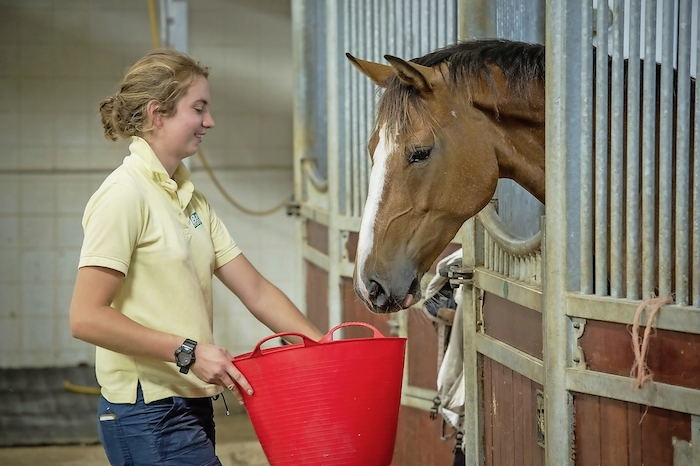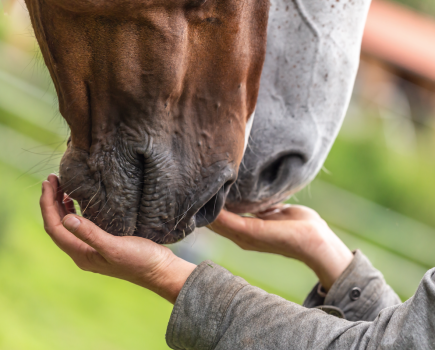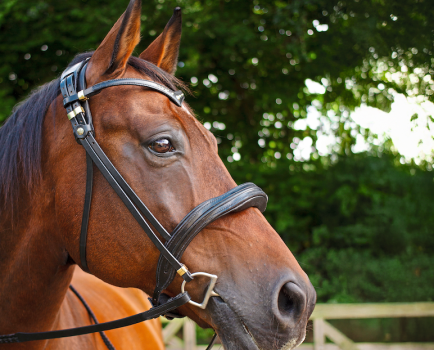Horses have complex digestive systems and providing them with a balanced diet is the basis of keeping them in good working order, which is where the 10 golden feeding rules come in.
A horse’s general health and wellbeing rely on you being able to abide by these feeding rules. It’s not just what’s in their bucket that counts — how and when you feed forage or hard feed is crucial too. Nailing a suitable feeding routine will help to prevent common (and serious) digestive disorders, such as colic and gastric ulcers.
Below are 10 golden rules for feeding a healthy horse.
1 Provide free access to clean, fresh water
Horses can drink around five to ten gallons of water each day, so make sure it’s available constantly. Keeping your troughs and buckets scrubbed clean, free from algae and removing any ice will encourage horses to continue drinking.
Water is the core ingredient for keeping a horse’s digestive system working correctly, which is why access to the wet stuff should never be restricted — especially around feed time.
This is one of the golden rules of feeding a horse. You can boost hydration levels by adding water to hard feed or using a soaked feed too.
2 Forage
Horses should be provided with access to ad-lib forage (grass, hay or haylage) throughout the day, which will maintain a healthy digestive system. This will be particularly important during the winter as forage will fuel the fermentation process within the hind gut, helping to keep your horse warm.
3 Feed little and often
Another rule when feeding a horse is to give food little and often. This is in order to satisfy our horses’ natural grazing behaviours. Feeding little and often is good management practice, alongside feeding no more than 2kg of concentrates per meal.
As horses are trickle feeders, placing forage in one or two haynets around the stable will allow your horse to graze between these throughout the day. This is a step towards cafeteria-style feeding, which has huge benefits for horses.
4 Avoid sudden dietary changes
When making changes to your horse’s diet, it’s important to do this gradually, ideally over a period of 7-10 days to avoid digestive upset or colic. This is another golden feeding rule that applies to all horses.
5 Monitor weight and condition
Because you see your horse every day, it can be tricky to notice the small changes in their weight and condition. Taking a weekly picture on your phone and using a weigh tape and body condition score chart will ensure they don’t lose or gain too much weight.
6 Extend their eating time
If you have a horse who’s a quick eater and bolts their feed, it’s really important to slow them down to avoid episodes of choke. Adding a chaff into your horse’s feed is a great way to do this.
However, if they can no longer manage a chaff, placing a large stone in the middle of a shallow bucket with the feed around it will also help. A soaked feed, fed sloppy, could also be useful in this scenario.
7 Bear in mind the horse’s veterinary history
Some conditions will require a strict feeding regime, so it’s always advisable to contact your feed manufacturer before buying the feed to make sure it’s suitable for your horse’s specific health condition.
8 Consider their workload
If you increase or decrease your horse’s workload, appropriate changes should be made to their diet to ensure they’re getting enough energy for their work.
The type of energy they need should also be considered. Quick-release energy will often be provided from competition or more traditional feeds that use molasses or cereal grains as energy sources. Slow-release energy will come from fibre and oil-based sources.
If your horse requires more energy in their feed but increasing what they have is affecting their behaviour, speak to a nutritionist. We, and other feed companies, all have a feed helpline that you can call for free help and advice.
9 Provide high-quality feeds
Never be tempted to feed out of date, dusty or mouldy feed to your horse as this may contribute to respiratory problems or colic.
10 Stick to a routine
Horses are creatures of habit who love routine so feeding at the same time each day will keep them happy. If you might be late, leave hard feed mixed and a haynet filled and ask someone else to pop them in to your horse.
If you’re on a DIY livery yard where people visit at different times and horses are fed separately, consider implementing a system where all feeds are pre-prepared and ready to put in by the first person to arrive. This makes for happier, more settled horses.
Main image © Your Horse Library/Kelsey Media Ltd








